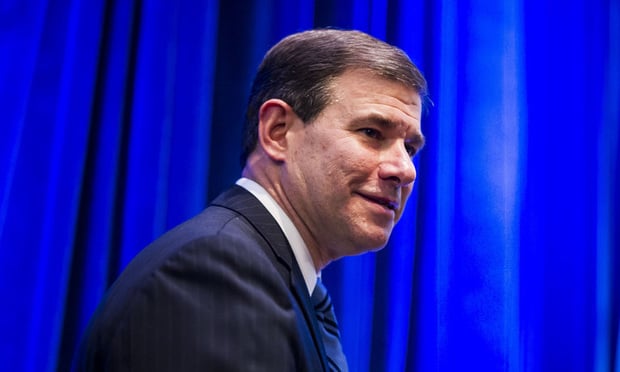Sentencing Debate Deeply Divides 11th Circuit Judges
The prisoner challenging her long sentence lost. The dissenting judges said the ruling will also adversely affect many others.
October 08, 2018 at 05:55 PM
8 minute read
 Elbert P. Tuttle U.S. Court of Appeals Building.
Elbert P. Tuttle U.S. Court of Appeals Building.
Nuts. Judicial Charade. Mess. Those are not words judges typically use to describe their own work. But that's what the U.S. Court of Appeals for Eleventh Circuit did in a 8-4 split 153-page en banc opinion debating federal minimum sentence mandates for violent crime.
The package released late Thursday includes a majority opinion from eight judges, a separate opinion from five of those concurring but explaining why, and two dissents joined by the four in the minority—plus a call for help from Congress to rewrite the Armed Career Criminal Act of 1984.
The prisoner challenging her sentence lost. The dissenting judges said the ruling will also adversely affect many others.
“The question before us is whether one of the key provisions of an important federal criminal statute, 18 U.S.C. § 924(c), is unconstitutionally vague,” Judge Kevin Newsom wrote for the majority. The law “makes it a federal offense—punishable by a term of imprisonment ranging from five years to life—for any person to use, carry, or possess a firearm in connection with a 'crime of violence.'”
Irma Ovalles challenged § 924(c)(3)'s “residual clause,” which defines the term “crime of violence” to mean a felony “that by its nature, involves a substantial risk that physical force against the person or property of another may be used in the course of committing the offense.”
Ovalles was represented by W. Matthew Dodge of the Federal Defender Program.
“I will file a cert petition in the Supreme Court,” Dodge said Monday. “The Eleventh Circuit's opinion here will prove fatal to dozens, if not hundreds, of cases in our circuit. Meanwhile, the circuit courts across the country are deeply divided. The government has filed cert petitions in some of the cases it has lost, and many defendants have done the same. We will join the parade soon.”
Arguing for the state was Jane McBath of the office of U.S. Attorney Byung “BJay” Pak for the Northern District of Georgia. Pak's spokesman did not immediately respond to a request for comment.
“In 2010, Irma Ovalles was charged by information with six robbery- and carjacking-related offenses, all of which arose out of what can only be described as a three-day crime binge,” Newsom said. He said the state's summary of evidence showed that “Ovalles and her co-conspirators robbed a grocery store, successfully carjacked three automobiles by force, and attempted to carjack a fourth.”
The attempted carjacking “serves as the predicate offense for Ovalles's § 924(c) conviction,” Newsom said. He added that the state's proffer “detailed that Ovalles and her co-conspirators approached a family getting out of their minivan, demanded the keys, hit the family's 13-year-old child in the face with a baseball bat, and then, in making their escape, fired an AK-47 assault rifle at the family and a Good Samaritan who had come to their aid.”
Newsom said Ovalles was charged with (1) attempted carjacking in violation of 18 U.S.C. § 2119 and (2) using and carrying a firearm during a “crime of violence”—the attempted carjacking—in violation of 18 U.S.C. § 924(c)(1)(A).
Ovalles pleaded guilty to all six counts. She was sentenced to nine years for each one to run concurrently, plus an additional 10 years to run consecutively for the 924(c) charge.
Newsom concluded that, if the law is read using a “categorical approach,” then “the clause Ovalles now challnges is “doomed.” That reading requires judges to overlook the action in question to consider whether the average crime of the same sort would carry a risk of violence. “On the flip side,” Newsom said, if the clause is interpreted using a “conduct-based approach” using real world facts from the case, “then the provision is not unconstitutionally vague.” Newsom invoked the canon of “constitutional doubt,” saying the U.S. Supreme Court has long held that “every reasonable construction must be resorted to in order to save a statute from unconstitutionality.”
 Judge William Pryor Jr., U.S. Court of Appeals for the Eleventh Circuit (Photo: Diego Radzinschi/ALM)
Judge William Pryor Jr., U.S. Court of Appeals for the Eleventh Circuit (Photo: Diego Radzinschi/ALM)Judge William Pryor wrote a separate concurring opinion, joined by Newsom, Chief Judge Ed Carnes and Judges Gerald Tjoflat and Elizabeth Branch. The majority opinion included those, plus judges Stanley Marcus, Robin Rosenbaum and Frank Hull.
“How did we ever reach the point where this court, sitting en banc, must debate whether a carjacking in which an assailant struck a 13-year-old girl in the mouth with a baseball bat and a cohort fired an AK-47 at her family is a crime of violence?” Pryor wrote. “It's nuts. And Congress needs to act to end this ongoing judicial charade.”
William Pryor said he fully joined Newsom's majority opinion, “but I write separately to explain why our resolution of this appeal forecasts how Congress should address the vexing issue of how to punish violent recidivists under laws like the Armed Career Criminal Act.”
The solution lies in “restoring the traditional role of the jury,” William Pryor said. “The caselaw about how to punish recidivists has confounded the federal courts for decades and has made the resolution of this appeal tricky, but our decision also suggests a way out of the mess.”
William Pryor said the “obvious solution” is for Congress to “rewrite the Armed Career Criminal Act and other recidivist statutes to require that the government must prove to a jury beyond a reasonable doubt that the defendant has previously been convicted of a felony the actual commission of which involved the use, attempted use, or threatened use of physical force against another person.”
He added that “tasking the jury with determining recidivism is consistent with the common law.”
 Judge Jill Pryor of the U.S. Court of Appeals for the Eleventh Circuit. (Photo: John Disney/ALM)
Judge Jill Pryor of the U.S. Court of Appeals for the Eleventh Circuit. (Photo: John Disney/ALM)But Judge Jill Pryor wrote that the majority was wrong and that their decision “perpetuates unconstitutional sentences” for other prisoners. Pryor was joined by Judges Charles Wilson, Beverly Martin and Adalberto Jordan.
“This case—with all its textual analysis, discussion of canons of statutory construction, and parsing of precedent—may come across like a purely academic exercise,” Jill Pryor said. “In reality, it is anything but. People who are serving sentences of five years to life under § 924(c) will get no relief from this Court even though the Supreme Court held that an identically-worded statute was so vague that its enforcement violated the right to due process under law.”
While agreeing with Jill Pryor, Martin wrote a separate dissent to say the decision reflects many others that she believes have left prisoners with overly harsh sentences.
“As United States Circuit Judges, we have been given great power and privilege. And our positions call upon us to decide the fate of many people who have neither,” Martin said. “In a nation that incarcerates a larger percentage of its population than almost all others, federal judges devote much time to examining (and reexamining) the sentences imposed on people serving time in our federal and state prisons. The interpretation the majority of this en banc court gives to the sentencing statute at issue here, which gives no relief for Irma Ovalles, presents the opportunity to review the development of this Circuit's sentencing jurisprudence in recent years.”
Martin said her review shows her colleagues are keeping people in prison for longer than necessary.
“Decisions of this court have left only a narrow path to relief for those serving sentences longer than the law now allows. Yet this narrow path is not mandated by decisions of the Supreme Court or by Acts of Congress. Indeed, this court has withheld relief from prisoners even when precedent counsels otherwise,” Martin said.
Martin said that “at every turn” her colleagues in the majority have “erred in ways that stopped prisoners from getting their sentences reviewed and prevented people who had meritorious claims from getting relief.”
The case is Ovalles v. U.S.A, No. No. 17-10172.
This content has been archived. It is available through our partners, LexisNexis® and Bloomberg Law.
To view this content, please continue to their sites.
Not a Lexis Subscriber?
Subscribe Now
Not a Bloomberg Law Subscriber?
Subscribe Now
NOT FOR REPRINT
© 2025 ALM Global, LLC, All Rights Reserved. Request academic re-use from www.copyright.com. All other uses, submit a request to [email protected]. For more information visit Asset & Logo Licensing.
You Might Like
View All

Alston & Bird, Eversheds Sutherland Ranked Among Top Firms Globally for M&A Deals in 2024
5 minute read
On The Move: Energy Infrastructure Pro Joins Moore & Van Allen, Adams & Reese Changes Atlanta Leadership
6 minute readTrending Stories
- 1'Not the President's Personal Lawyer': Lawyers Share Concerns Over How AG Pick Bondi’s Loyalism to Trump May Impact DOJ
- 2US Judge OKs Partial Release of Ex-Special Counsel's Final Report in Election Case
- 3The Demise of Truth and Transparency in Federal Sentencing
- 4Former Phila. Solicitor Sozi Tulante Rejoins Dechert
- 5'I've Seen Terrible Things': Lawyer Predicts Spike in Hazing Suits
Who Got The Work
Michael G. Bongiorno, Andrew Scott Dulberg and Elizabeth E. Driscoll from Wilmer Cutler Pickering Hale and Dorr have stepped in to represent Symbotic Inc., an A.I.-enabled technology platform that focuses on increasing supply chain efficiency, and other defendants in a pending shareholder derivative lawsuit. The case, filed Oct. 2 in Massachusetts District Court by the Brown Law Firm on behalf of Stephen Austen, accuses certain officers and directors of misleading investors in regard to Symbotic's potential for margin growth by failing to disclose that the company was not equipped to timely deploy its systems or manage expenses through project delays. The case, assigned to U.S. District Judge Nathaniel M. Gorton, is 1:24-cv-12522, Austen v. Cohen et al.
Who Got The Work
Edmund Polubinski and Marie Killmond of Davis Polk & Wardwell have entered appearances for data platform software development company MongoDB and other defendants in a pending shareholder derivative lawsuit. The action, filed Oct. 7 in New York Southern District Court by the Brown Law Firm, accuses the company's directors and/or officers of falsely expressing confidence in the company’s restructuring of its sales incentive plan and downplaying the severity of decreases in its upfront commitments. The case is 1:24-cv-07594, Roy v. Ittycheria et al.
Who Got The Work
Amy O. Bruchs and Kurt F. Ellison of Michael Best & Friedrich have entered appearances for Epic Systems Corp. in a pending employment discrimination lawsuit. The suit was filed Sept. 7 in Wisconsin Western District Court by Levine Eisberner LLC and Siri & Glimstad on behalf of a project manager who claims that he was wrongfully terminated after applying for a religious exemption to the defendant's COVID-19 vaccine mandate. The case, assigned to U.S. Magistrate Judge Anita Marie Boor, is 3:24-cv-00630, Secker, Nathan v. Epic Systems Corporation.
Who Got The Work
David X. Sullivan, Thomas J. Finn and Gregory A. Hall from McCarter & English have entered appearances for Sunrun Installation Services in a pending civil rights lawsuit. The complaint was filed Sept. 4 in Connecticut District Court by attorney Robert M. Berke on behalf of former employee George Edward Steins, who was arrested and charged with employing an unregistered home improvement salesperson. The complaint alleges that had Sunrun informed the Connecticut Department of Consumer Protection that the plaintiff's employment had ended in 2017 and that he no longer held Sunrun's home improvement contractor license, he would not have been hit with charges, which were dismissed in May 2024. The case, assigned to U.S. District Judge Jeffrey A. Meyer, is 3:24-cv-01423, Steins v. Sunrun, Inc. et al.
Who Got The Work
Greenberg Traurig shareholder Joshua L. Raskin has entered an appearance for boohoo.com UK Ltd. in a pending patent infringement lawsuit. The suit, filed Sept. 3 in Texas Eastern District Court by Rozier Hardt McDonough on behalf of Alto Dynamics, asserts five patents related to an online shopping platform. The case, assigned to U.S. District Judge Rodney Gilstrap, is 2:24-cv-00719, Alto Dynamics, LLC v. boohoo.com UK Limited.
Featured Firms
Law Offices of Gary Martin Hays & Associates, P.C.
(470) 294-1674
Law Offices of Mark E. Salomone
(857) 444-6468
Smith & Hassler
(713) 739-1250







